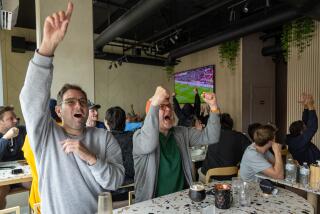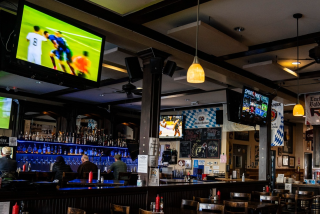London likes its football bare-kneed, bare-knuckled
London — IT started at 2 p.m. on a grubby, low-ceilinged platform at London’s King’s Cross St. Pancras Underground station. A group of gangly teenage lads, clad in a variety of blue-and-white scarves and woolen hats, shuffled their feet and whispered jokes while devouring large candy bars with the kind of rapidity only ravenous adolescents can muster.
Their nervous energy touched a chord in me. I was returning to London to see my first live English soccer match in 20 years, and these were the first supporters I spotted, fans of my favorite team, Queens Park Rangers, or QPR. They looked about the same age I had been when I attended my last match.
When you grow up in or around London or if you’re just a visitor, you have an unrivaled choice of professional teams to choose from, including some of the top clubs in English football. (Yes, football. I won’t be calling it soccer for the rest of this story.)
Many are attracted to the bright lights of the Chelsea or Arsenal teams, but some attach themselves to the smaller teams for whom every supporter is vital.
These less fashionable London clubs -- QPR, West Ham and Crystal Palace, among them -- are the kind of take-you-on-a-roller-coaster-ride, break-your-heart teams that always seem worth supporting.
London is the spiritual home of football, said to be the most popular spectator sport in the world. Its modern rules were formulated in a pub in the city in 1863. Nearly 150 years later, London has 11 professional football teams.
The English football season runs from August until May, and although Saturday afternoon is the traditional match day, matches are also held during the week. Kickoffs are 3 p.m. Saturdays, and weekday matches usually start at 8 p.m.
Many Londoners go to these matches as if their lives depend on it. For a visitor, however, catching a football match offers an opportunity to peek into the local culture and soak up some sporting color away from the typical tourist haunts.
And as unhappy as fans may be to see England’s football season coming to an end, they have this summer’s FIFA World Cup to look forward to. The matches begin June 9 in a dozen German cities. With England one of the favorites, every pub TV in London will be tuned to the action.
*
Excitement in the air
AS the packed Hammersmith & City Line train squealed into the station, the blurred pockets of blue and white coagulated into a single theme: The cars were jammed with QPR fans. After a few stops, we spilled onto the platform at Shepherd’s Bush station and began the slow shuffle, in blazing spring sunshine, along cheerfully shabby High Street.
QPR is one of the smaller London teams, but attending a match here is just like catching a match at any one of England’s 92 professional clubs. While the QPR faithful were walking toward their stadium, thousands of fans across the country were doing the same in their hometowns, strolling from the train station through residential neighborhoods, dropping into local pubs for a pre-match beer and practicing their well-worn chants for the match ahead.
Within 10 minutes, we were at Loftus Road Stadium, an ugly but functional melange of brick and blue corrugated steel that has stood here in various incarnations for decades, although it’s not nearly as old as the club, which was founded in 1882.
The first stop was one of the official souvenir stands around the stadium’s bustling exterior, my opportunity to catch up on two decades of missed merchandising.
I dutifully picked up a striped “We are QPR” mug, some temporary tattoos of the club’s official logo (it seemed like a good idea at the time) and a white T-shirt marking the team’s finest hour: its 1967 League Cup final victory over West Bromwich Albion. Recalling the 3-2 triumph still triggers a surge of pride in many supporters -- even those, like me, who weren’t born when the legendary Wembley Stadium match took place.
I milled around for a while, rubbing shoulders with the other fans -- wide-eyed children attending their first match with proud parents; tough-looking twentysomethings who had come straight from the nearest bar; middle-aged, weather-beaten season-ticket holders who have supported the team through thick and thin (mostly thin); and lone old men shuffling toward their regular spots in the stadium, clutching bags of sandwiches and the occasional thermos of tea.
This disparate group was bonded for the next couple of hours by a shared love for a team that’s often the dictionary definition of underdog.
With 20 minutes before kickoff, I pushed through the gate into the stadium, scaled the concrete steps and stood blinking in the aisle at the appealing panorama. Fans know this first view on match day: the empty pitch a blank sheet of possibility and the four steeply graded stands alive with the movement of supporters. It always elicits a shiver of excitement, no matter how many matches you’ve attended.
The compact, open-air stadium seemed much smaller than on my last visit in 1985, when I stood wedged against a railing at pitch level, the crowd surging and swaying like a sinewy tidal wave behind me. (Since the 1989 Hillsborough Stadium disaster in Sheffield, in which 96 fans were crushed to death, Britain’s professional football grounds have been all-seaters -- although that doesn’t stop excitable fans from leaping up to shout at the referee or jeer at opposing supporters.)
At this match, these supporters were from Watford Football Club in nearby Hertfordshire, and they occupied a section of one stand behind one of the goals.
They were outnumbered about 20 to 1 by the home crowd in the stadium’s remaining three sides. My seat was about halfway up from pitch level above the center line, an excellent spot from which to see the action.
A tense silence descended over the crowd of almost 17,000. Then the whistle was blown. There was a frantic, scrappy feel to these first few minutes as the teams wrestled for early dominance.
Despite the supporters’ best efforts, the home team didn’t score in the first 30 minutes. Fans sang and chanted and taunted but without obvious effect on the opposing team.
*
Margin of victory
MANY English clubs have been in existence for more than a century, but money’s influence on the game and the structure of the football league have changed.
Now, the league comprises 92 teams across the country divided into four hierarchical divisions. The leading clubs -- Manchester United, Chelsea, Arsenal and Liverpool among them -- clash in the top-ranking Premier League.
Teams like QPR fight in the lesser championship division for a chance to graduate to the Premier League, where the big bucks are.
The financial gap between the ever-richer top clubs and those in the lower divisions has increased significantly, and smaller teams must struggle to make ends meet.
Despite the financial disparity, matches at smaller professional clubs are no less exciting. Each 90-minute match is divided into halves, and well-matched teams -- particularly local rivals -- can create an edge-of-your-seat competition that’s as fast-paced as a basketball game. Matches tend to be low scoring, but noisy fans constantly urge their team forward to find the goal.
At 33 minutes, prolific QPR scorer Paul Furlong did just that, expertly volleying past the outstretched fingertips of the diving Watford goalkeeper into the corner of the net.
A silence was followed by an ear-splitting roar as the crowd on three sides of the stadium jumped to its feet, punching the air.
The next 10 minutes were a QPR dream: well-oiled passing, half-a-dozen close shots on the Watford goal and plenty of back-slapping camaraderie among the home fans.
As some fans sneaked toward the food stands, QPR slipped in a second goal. The jubilant supporters were on their feet again just as the referee blew the whistle signaling the end of the first 45 minutes.
Halftime at an English football match is a 15-minute opportunity to line up for the bathrooms, squeeze through the crowded bars or join the short lineups at the burger kiosks that ring the inside of almost every stadium.
At Loftus Road, the narrow corridors behind the seats quickly filled with cigarette smoke and animated conversations. I pushed my way to the bar for a bottle of cold Carlsberg lager before finding a space to slouch against the wall.
A couple of towering supporters in their 20s leaned next to me, each with the red-faced look of those who have had quite a few drinks already. Their team was in the lead, and they were in a good mood.
The same couldn’t be said of Watford. The team started the second half much as it ended the first half.
But the home team, resting on its two-goal lead, was coasting, a dangerous strategy that has led to problems before. My worries soon seemed misplaced when QPR scored again at the 57-minute mark.
The crowd, now chanting “Ea-sy! Ea-sy! Ea-sy!” was pushing for a rout.
But the Watford players had not given up, and with 11 minutes left, they managed a goal. It was their last gasp.
Contented QPR fans worked through their catalog of victory chants and some even began leaving, eager to beat the rush for the exits. As the final whistle sounded, sustained applause enveloped the stadium.
The QPR fans exited slowly, smiling broadly, patting one another’s shoulders, and making plans to hit the nearest pub.
As we streamed back through the residential streets toward the Underground station, the low evening sun cast an appropriate golden glow over the memory. For an expat supporter like me, it had been worth the 20-year wait.
*
(BEGIN TEXT OF INFOBOX)
Get your kicks
GETTING THERE:
From LAX, nonstop service to London is available on British, Air New Zealand, Virgin Atlantic, United and American, and direct service (stop, no change of planes) is offered on US Airways. Restricted round-trip fares begin at $558.
TELEPHONES:
To call the numbers below from the U.S., dial 011 (the international dialing code), 44 (country code for Britain) and the local number.
TICKETS:
England’s professional soccer season runs from August until May.
For more information on the game, visit the Football Assn. website, www.thefa.com.
Tickets for top-flight Premier League clubs like Arsenal 207-704-4040, www.arsenal.com, and Chelsea, 207-915-2951, www.chelseafc.com, are always in great demand and need to be purchased as far in advance as possible. Entry to these games typically costs $61-$88 for adults.
It’s much easier -- and cheaper -- to catch a match of a smaller club like Queens Park Rangers, where adult ticket prices are $38-$49. For information on upcoming QPR games and ticket purchasing, visit www.qpr.co.uk or call 870-112-1967. The club’s Loftus Road Stadium is a 10-minute stroll from Shepherd’s Bush Hammersmith & City Line Underground station.
TO LEARN MORE:
For general information on traveling to and around England, call (800) GO-2-BRITAIN (462-2748) or visit www.visitbritain.com.
-- John Lee
More to Read
Sign up for The Wild
We’ll help you find the best places to hike, bike and run, as well as the perfect silent spots for meditation and yoga.
You may occasionally receive promotional content from the Los Angeles Times.






